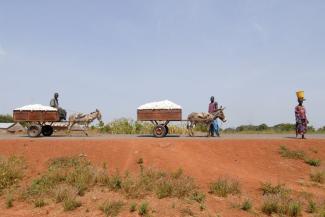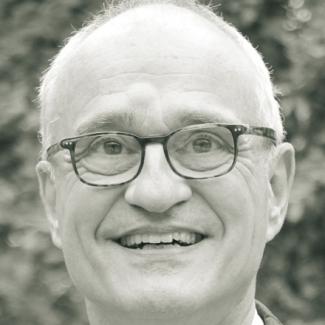Agriculture and food production
Unblocking investments

We must prepare rural regions for the future – not only in order to eradicate hunger, but just as much to achieve the other SDGs. We must ensure that people have prospects.
Strong rural infrastructure is of the essence. Rural areas all over the world are undergoing structural change at various speeds. Human labour in the agriculture and food sectors is becoming more productive due to capital investments and enhanced knowledge. Innovation has become the most important driving force. Policymakers should support this trend – and make use of it by gearing structural change to sustainability and social equity.
Ultimately, change is driven by the investment decisions of millions and millions of individuals – consider smallholder farmers, input providers and merchants, for instance, or food processors, the providers of financial services and many others. The speed and impact of their investments, however, depend on the business environment that policymakers and public administrations bring about.
Research shows that public expenditure on infrastructure matters. Relevant issues include electrification, roads, telecommunication, rail and port facilities, irrigation, smallholder-oriented agricultural research and development, but also farmer education, extension services, schools, health stations, drinking-water supply and sanitation. They all boost competitiveness at the local level and help smallholders to profit from agricultural value chains. Most often, government initiatives are needed, but prudent regulation can facilitate meaningful infrastructure contributions from private-sector companies too.
The fundamental challenge is to create conditions that are conducive to job generation in rural areas. This is especially true in Africa, a continent that is not well placed in the global economy to create jobs in manufacturing. The core issue is to invest in sectors according to a region’s specific potentials. For obvious reasons, it makes sense to foster development in agriculture and food processing, whilst also supporting related sectors that either provide inputs or purchase products.
Once agriculture and food businesses begin to thrive, additional incomes are generated. This money will stimulate local demand for building materials, clothes, transport opportunities, service providers et cetera, leading to yet more employment. This is how endogenous, sustainable development is triggered at the rural level.
Germany’s Federal Ministry for Economic Cooperation and Development (BMZ) is convinced that a broad-based, holistic approach is needed to overcome hunger and malnutrition. Accordingly, it is supporting the growth of agriculture, the backbone of rural development. At the same time, the BMZ is investing in many sectors that are linked to farming, including physical and social infrastructure, services and sustainable resource management.
The BMZ has substantially boosted its efforts in the past two years in the context of its One World No Hunger initiative. It is now involved in matters of strategic relevance that were previously neglected, including the promotion of innovations in agriculture and food sectors, taking cross-cutting approaches to food security and protecting the quality of soils. We have agreed joint programmes on food security and rural development with 15 partner countries. The BMZ is investing an annual € 1.5 billion. Together with its partners it wants to unblock investments and promote science-based, modern approaches in agriculture and food industries, for example, by establishing green innovation centres.
Stefan Schmitz heads the One World No Hunger initiative and ranks as deputy director general at Germany’s Federal Ministry for Economic Cooperation and Development (BMZ).
stefan.schmitz@bmz.bund.de













